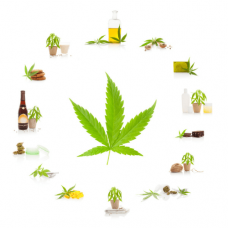Hemp: From Prohibition to Opening up the Future
Hemp is a plant that has fascinated mankind for centuries with its amazing versatility. This plant has many beneficial properties and a wide range of uses. Let's look at how hemp has become firmly established in human history and what amazing properties make it so valuable.

History and anthropology of hemp
According to archaeological data, hemp has been used by humanity for more than 10,000 years. It was one of the first plants to be bred for fiber, food and oil. Hemp was known and used in ancient cultures in various parts of the world. Its fiber was used to create clothing, rope and even ship sails. Hemp oil was a popular product in ancient civilizations and was used in cooking and medicine.
Hemp also has an important place in anthropology. Hemp seeds have been found in archaeological sites around the world, providing evidence of its ancient use. It has been part of ancient rituals and medical practices of different cultures.
Industrial and edible hemp
The two main types of hemp that people were interested in were industrial and edible hemp. The two types have different characteristics and uses.
Industrial hemp is grown primarily for its fiber. Its stems are rich in long fibers, which are used to create fabrics, ropes and other textile products. Industrial hemp is also used in construction to create insulating materials and even biofuel.
Edible hemp focuses on seed production. These seeds are rich in protein, vitamins and minerals. They can be eaten, added to salads and dishes, or can be used to extract hemp oil. Hemp oil is rich in polyunsaturated fatty acids, which have a beneficial effect on human health.
Industrial Revolution and hemp
Hemp played an important role in the industrial revolution that changed the world in the 19th century. Its fiber was used in the textile industry to create durable materials such as canvas and bags. This has increased productivity and improved the quality of various products.
Hemp oil has also found its use in mechanical engineering and as a lubricant. It was extremely popular in times when modern synthetic lubricants did not exist.
Prohibition and return to hemp
Until the beginning of the 20th century, hemp was an important cultural and economic resource in many countries. However, with the advent of prohibitions on certain types of cannabis-related drugs, many governments have imposed restrictions on the cultivation and use of this plant.
However, recent decades have brought a new perspective on hemp. In some countries, it has again become legally grown and used in various fields. This turnaround is driven by the realization of hemp's potential as a sustainable resource and source of many beneficial products.
Industrial uses of hemp
Modern industrial uses of hemp include a variety of industries. For example, industrial hemp continues to be used in the textile industry to create environmentally friendly fabrics. Its fiber is also used to make paper and biofuel.
In construction, hemp fiber has found use as insulating materials. It is an environmentally friendly and effective way to improve the energy efficiency of buildings. Kostya, obtained by processing hemp stems, is also used in construction as bulk insulation.
Food and medical uses of hemp
Edible hemp has become popular again due to its high nutritional value. Hemp seeds are rich in protein, which is considered one of the most complete and easily digestible sources of plant protein. They also contain omega-3 and omega-6 fatty acids, vitamins and minerals.
Hemp oil is obtained from hemp seeds, which is used in cooking. This oil has a unique taste and aroma and can be used in preparing various dishes.
The medicinal uses of cannabis have also attracted a lot of interest. Cannabidiol (CBD), one of the chemical components of cannabis, has no psychoactive properties but has potential in the treatment of various diseases. Research has shown that CBD can help patients with epilepsy, Alzheimer's, Parkinson's, and multiple sclerosis.
Hemp in the modern world
The modern world is rediscovering the potential of hemp. In some countries, the active development of industry related to this plant begins. Scientific research continues to explore diverse aspects of hemp, from its genetic structure to potential applications.
Thus, hemp is a plant with many faces. Its history is rich and impressive, and modern research is revealing new perspectives for the use of this plant. From textiles to food and medicine, hemp remains a vital resource in the modern world.
Hemp in the textile industry
Production of environmentally friendly fabrics and materials
Industrial hemp, thanks to its long fibers, is ideal for the production of environmentally friendly textile materials. Fabrics made from hemp have unique properties. They are durable, resistant to wear and practically do not wrinkle. Hemp fibers also have excellent moisture-absorbing and moisture-wicking properties, making hemp fabrics ideal for sportswear and underwear.
Innovation in the textile industry
In recent decades, the textile industry has begun to rethink its processes and materials to reduce its environmental impact. In this context, hemp becomes relevant again, since its cultivation requires much less pesticides and water compared to cotton. This makes hemp one of the more environmentally sustainable options for textile production.
Hemp in construction and insulation
Eco-friendly building materials
Hemp is also finding its place in the construction industry. After processing, hemp stems can be used as bulk insulation for building structures. This material is environmentally friendly, effectively retains heat and provides good sound insulation. Additionally, hemp fiber is fire-resistant, making it safe for use in construction.
Bio-structures and environmentally friendly housing
Hemp is also used in the creation of bio-structures - environmentally friendly materials for construction. Thanks to hemp, it is possible to create insulating blocks, biocement and other environmentally friendly materials that can be used in the construction of housing and commercial buildings.
Hemp in the food industry
Nutritional Richness of Hemp
Edible hemp, particularly its seeds, is renowned for its nutritional value. Hemp seeds are rich in protein and contain all nine essential amino acids, making them a complete source of plant-based protein. In addition, hemp seeds are fortified with vitamins and minerals, including B vitamins, vitamin E, iron, magnesium and zinc.
Hemp oil and its health benefits
Hemp oil is extracted from hemp seeds and is becoming increasingly popular in cooking and healthy eating. This oil has a pleasant nutty taste and aroma and can be used for salad dressings, cooking, and in desserts.
However, the benefits of hemp oil are not limited to just taste. The oil is rich in polyunsaturated fatty acids such as omega-3 and omega-6. These fatty acids help lower blood cholesterol levels and have a beneficial effect on the cardiovascular system.
Medical potential of hemp and CBD
Cannabidiol (CBD) and its role in medicine
Cannabidiol (CBD) is one of the chemical components of cannabis that has no psychoactive properties but has enormous potential in medicine. Research has shown that CBD can help patients with a variety of conditions, including epilepsy, Alzheimer's disease, Parkinson's disease, and multiple sclerosis. This opens up new prospects for treating and improving the quality of life of people suffering from these diseases.
Regulation of homeostasis
In addition to its medicinal properties, CBD can help regulate homeostasis in the body. Homeostasis is the balance between various systems and processes in the human body necessary to maintain health. Cannabidiol acts on receptors inside our body and promotes recovery and improvement of overall health.
Conclusion: Hemp is the plant of the future
In conclusion, hemp remains one of the most versatile and promising plants, providing mankind with many beneficial products and resources. With its rich history, variety of uses and new research, hemp continues to inspire us with its potential.
Modern technologies and scientific research help us to more fully use this valuable resource, opening up new opportunities in various fields, from industry and agriculture to medicine and ecology. Hemp is not just a plant of the past, but a plant of the future that has the potential to improve our lives and make the world a more sustainable and healthy place.
.png)










 to order a call
to order a call 

